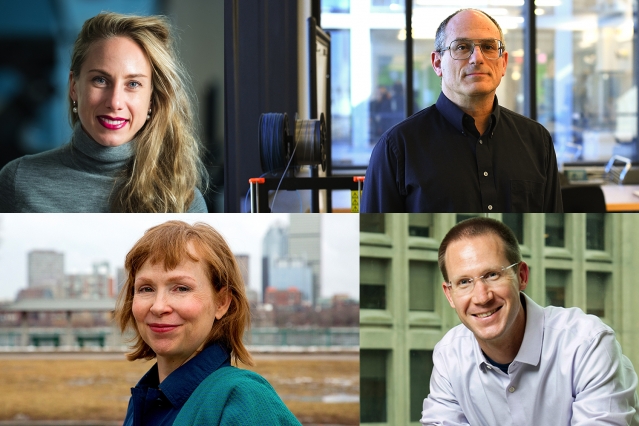EECS Professor Jacob White named 2020 MacVicar Fellow

The 2020 MacVicar Faculty Fellows are: (clockwise from top left) Polina Anikeeva, Jacob White, William Tisdale, and Mary Fuller. Photos: (clockwise from top left) Lillie Paquette, Sampson Wilcox, Webb Chappell, Jon Sachs
Alison Trachy | Registrar’s Office
Editor’s Note: This article has been updated to indicate that the annual MacVicar Day symposium, scheduled for March 13, has been cancelled due to concerns over the coronavirus outbreak. An event honoring the new MacVicar Fellows will be scheduled at a later date.
EECS faculty member Jacob White, Cecil H. Green Professor of Electrical Engineering and Computer Science, is among four MIT faculty members named as this year’s Margaret MacVicar Faculty Fellows.
The other fellows, announced by the Office of the Vice Chancellor and the Registrar’s Office announced on Monday, include Polina Anikeeva, associate professor of materials science and engineering; Mary Fuller, professor of literature; and William Tisdale, Arco Career Development Professor of Chemical Engineering.
Role models both in and out of the classroom, the new fellows have tirelessly sought to improve themselves, their students, and the Institute writ large. They have reimagined curricula, crossed disciplines, and pushed the boundaries of what education can be. They join a matchless academy of scholars committed to exceptional instruction and innovation.
The new fellows will be celebrated at a future event. (The annual MacVicar Day symposium, initially scheduled for March 13, has been cancelled due to concerns about the global coronavirus outbreak.)
For nearly three decades, the MacVicar Faculty Fellows Program has been recognizing exemplary undergraduate teaching and advising around the Institute. The program was named after Margaret MacVicar, the first dean for undergraduate education and founder of the Undergraduate Research Opportunities Program (UROP). Nominations are made by departments and include letters of support from colleagues, students, and alumni. Fellows are appointed to 10-year terms in which they receive $10,000 per year of discretionary funds.
In nominating White for the fellowship, colleagues and students alike observed his dedication not just to teaching, but to improving teaching throughout the Institute. “Jacob completely understands that the most efficient way to make his passion and ideas for undergraduate education have a real lasting impact is to ‘teach it to the teachers,'” Asu Ozdaglar, department head and School of Engineering Distinguished Professor of Engineering, and Luca Daniel, professor of EECS, noted in their nomination letter.
One student wrote that White “has spent significant time and effort educating the lab assistants” of 6.302 (Feedback System Design). As one of these teaching assistants confirmed, White’s “enthusiastic spirit” inspired them to spend hours discussing how to best teach the subject. “Many people might think this is not how they want to spend their Thursday nights,” the student wrote. “I can speak for myself and the other TAs when I say that it was an incredibly fun and educational experience.”
His work to improve instruction has even expanded to other departments. A colleague describes White’s efforts to revamp 8.02 (Physics II) as “Herculean.” Working with a group of students and postdocs to develop experiments for this subject, “he seemed to be everywhere at once … while simultaneously teaching his own class.” Iterations took place over a year and a half, after which White trained the subject’s TAs as well. Hundreds of students are benefitting from these improved experiments.
White is, according to Daniel and Ozdaglar, “a colleague who sincerely, genuinely, and enormously cares about our undergraduate students and their education, not just in our EECS department, but also in our entire MIT home.”
When he’s not fine-tuning pedagogy or conducting teacher training, he is personally supporting his students. A visiting student described White’s attention: “He would regularly meet with us in groups of two to make sure we were learning. In a class of about 80 students in a huge lecture hall, it really felt like he cared for each of us.”
And his zeal has rubbed off: “He made me feel like being excited about the material was the most important thing,” one student wrote.
The significance of such a spark is not lost on White. “As an MIT freshman in the late 1970s, I joined an undergraduate research program being pioneered by Professor Margaret MacVicar,” he says. “It was Professor MacVicar and UROP that put me on the academic’s path of looking for interesting problems with instructive solutions. It is a path I have walked for decades, with extraordinary colleagues and incredible students. So, being selected as a MacVicar Fellow? No honor could mean more to me.”
White, an EECS faculty member since 1987, is chair of MIT’s Committee on Curricula. He received a bachelor’s degree from MIT and master’s and doctoral degrees from the University of California at Berkeley, all in electrical engineering and computer science.
For more on the MacVicar Fellows, including this year’s other recipients, please visit the MIT News website.
Media Inquiries
Journalists seeking information about EECS, or interviews with EECS faculty members, should email eecs-communications@mit.edu.
Please note: The EECS Communications Office only handles media inquiries related to MIT’s Department of Electrical Engineering & Computer Science. Please visit other school, department, laboratory, or center websites to locate their dedicated media-relations teams.